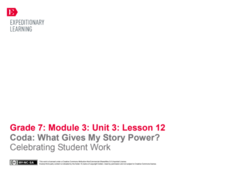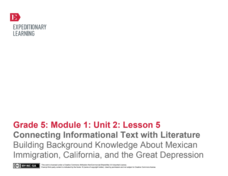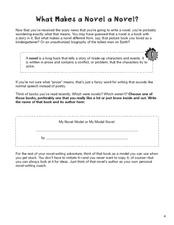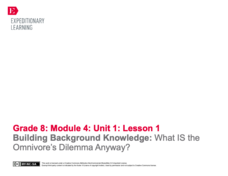EngageNY
Finishing Poster and Preparing for Gallery Walk
Practice makes progress! Using their drafts and resources from the previous lesson, pupils complete scientific posters for an upcoming gallery walk. Next, they practice presenting their posters to assigned partners.
EngageNY
Performance Task: Hosted Gallery Walk of Scientific Posters
The guests have arrived. Scholars participate in a hosted gallery walk, using their scientific posters to share their research about DDT with their classmates. Then, using sticky notes, individuals leave positive feedback on their peers'...
EngageNY
Clarifying Thinking on Water Management: Revisiting the Gallery Walk
One, two, three, go! Scholars gather in triads and number themselves one to three. Each number is responsible for sharing a section of the map homework completed the night before as learners discuss domain-specific vocabulary terms using...
Curated OER
The Last Lecture: Gallery Walk
As part of a discussion of The Last Lecture, class members engage in a gallery walk silent discussion by recording their responses to a series of questions and images posted about the classroom.
EngageNY
Grade 9 ELA Module 2: Unit 1, Lesson 10
An engaging unit connects Edgar Allan Poe and Emily Dickinson's shared themes of madness and departure from reality. The 10th lesson in the unit explores Dickinson's figurative language and structure choices in "I Felt a Funeral, in my...
EngageNY
Introducing Module 4B: “Water Is Life”
Learners take a gallery walk around the classroom to view various images and quotes. As they walk, they write down what they notice and wonder about what they see. After discussing their notice and wonder notes, they read the...
EngageNY
End of Unit 2 Assessment: A Hosted Gallery Walk
Speak your mind. Scholars present their claims in groups of three. They use a presentation checklist as each member takes a turn. At the end of the lesson plan, pupils complete an End of Unit 2 Assessment: Presenting a Claim and Findings...
EngageNY
Mid-Unit Assessment: Classifying and Evaluating Primary Sources
Let's take a walk—a gallery walk. Scholars complete a mid-unit assessment relating to Unbroken by taking a gallery walk to view the various primary source mediums. They then use organizers to select three sources and respond to...
EngageNY
Mid-Unit Assessment: Getting to Know a Character: What Details in the Text Help Us Understand Ha?
Take a walk with me. Scholars participate in a gallery walk of the anchor charts their groups created about Inside Out & Back Again in the previous lesson plan. Pupils take notes about Ha's character on sticky notes as they take the...
EngageNY
Launching the Module: The Universal Appeal of Shakespeare, Part 1
Class members participate in a gallery walk, viewing images of Shakespeare and his plays. Additionally, pupils complete a T-chart to consider the advantages and disadvantages of learning about Shakespeare with images and text.
EngageNY
Final Performance Task: Sharing Visual Representations of Position Papers
It's time to put down those pencils and celebrate! Scholars share the visual representations of their position papers with the class. They participate in a gallery walk to view each other's work, writing a piece of praise for their...
EngageNY
Coda: What Gives My Story Power? Celebrating Student Work
It's time for a celebration! Scholars go on a gallery walk around the classroom to view their peers' completed illustrated children's stories. Using sticky notes, pupils provide feedback about the powerful elements they find in their...
EngageNY
Independent Reading: Final Product
Cheater! Scholars create independent reading cheat sheets to help others learn about a book. They rate the book, list quotes, and describe how they connected to the text. Readers share their cheat sheets with others and conduct a gallery...
EngageNY
Final Performance Task: Sharing Visual Representations of Position Papers
Let's take a stroll! Scholars go on a gallery walk to view the visual representations for the performance task created by the class. They then view a variety of books about environment and sustainability and conduct book talks on the...
News Literacy Project
InfoZones
Not all information is created equal. Scholars embark on a gallery walk around the classroom to view six examples of information and identify their primary purposes. Next, pupils complete a graphic organizer to evaluate the different...
EngageNY
Synthesizing Research: How Colonists Were Interdependent
Following the formative assessment of this unit, young scholars present the information they gathered on their specific colonial trade to the rest of the class. Working in groups, learners create posters describing the particular job...
EngageNY
Introducing Module 2: Working Conditions—Then and Now
Let's get visual! Scholars embark on a gallery walk around the classroom to view quotes, images, and videos about historical and modern working conditions in various professions. They consider how working conditions have changed over...
EngageNY
Final Performance Task: Delivering an Opinion Speech with Multimedia Display
Welcome to the grand finale! Scholars practice reading their speeches to a partner and make last-minute changes based on feedback. Pupils then present their final opinion speeches to their small groups and show off their work in a...
EngageNY
Connecting Informational Text with Litearature: Building Background Knowledge About Mexican Immigration, California, and the Great Depression
Help your class transition as the setting in the novel Esperanza Rising, by Pam Muñoz Ryan, moves from Mexico to California. Beginning with prior knowledge, and moving into jigsaw research groups, class members add to and create posters...
Curated OER
What Makes a Novel a Novel?
As your authors prepare to write a hypothetical novel, they need all the inspiration they can find! Using a book they have already read (and enjoyed), learners complete a literary analysis by filling in eight short-answer questions....
Curated OER
Teaching The Great Gatsby with the New York Times
East Egg, West Egg, the Valley of Ashes, and the green light. Bring Gatsby, the Jazz Age, and the American Dream to your classroom with a resource designed for teachers. Included in the treasury are six great teaching ideas for F. Scott...
EngageNY
Launching the Text: Building Background Knowledge on Louie Zamperini and World War II (Preface, Pages 3–6)
Scholars participate in a gallery walk to examine photographs related to WWII and record thoughts about the pictures in note catchers. At the end of the gallery walk, pupils share their observations before participating in a discussion...
EngageNY
Building Background Knowledge: What IS the Omnivore’s Dilemma Anyway?
What's the best thing on the menu? Scholars enter the room, complete a gallery walk of menus to choose a food to pretend to order, and then discuss how they made the decision. Next, they read The Omnivore's Dilemma and relate their...
EngageNY
Mid-Unit Assessment: Classifying and Evaluating Primary Sources
Let's go for a walk. Learners complete the mid-unit assessment by completing a gallery walk to analyze different primary sources discussed while reading A Mighty Long Way. After viewing the sources, class members complete organizers and...

























